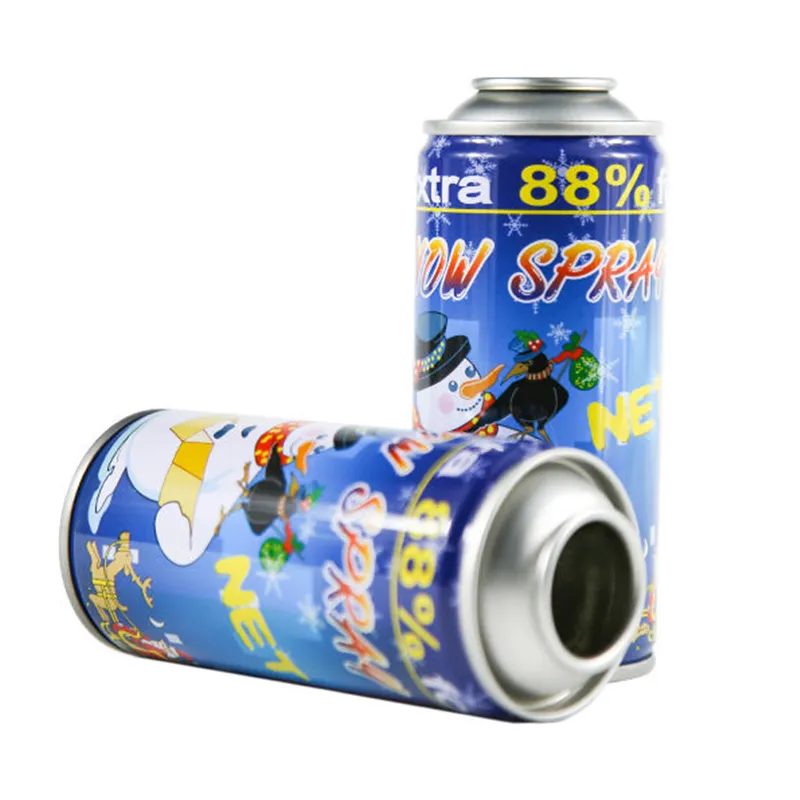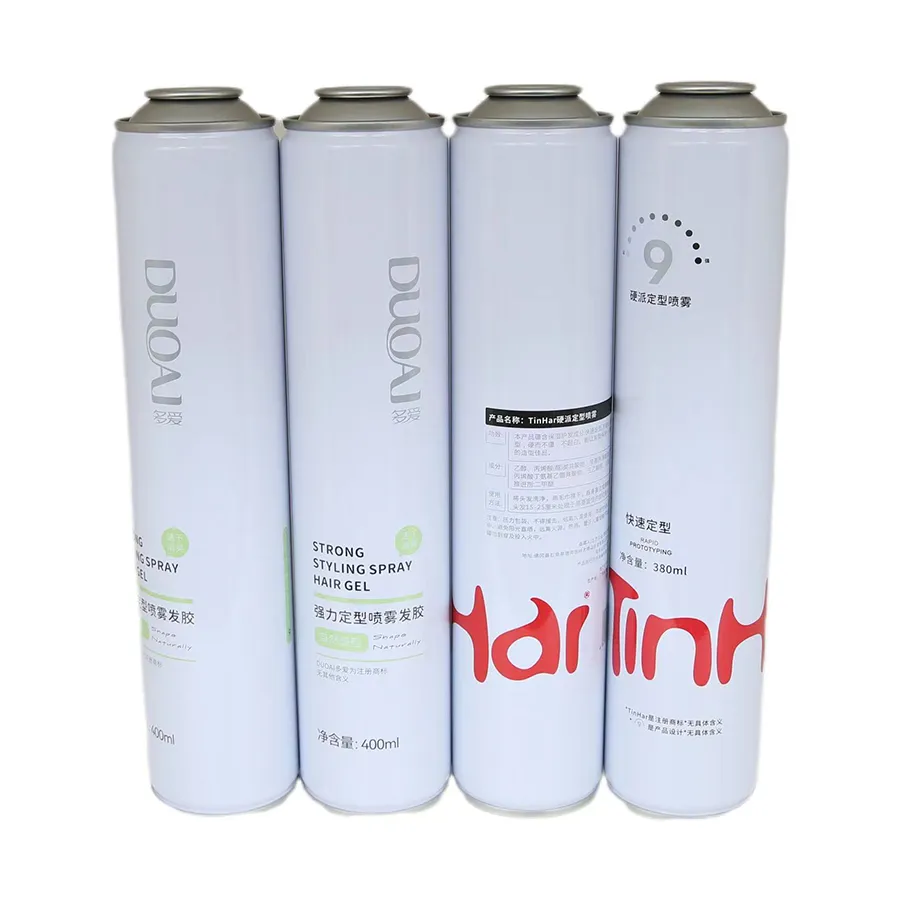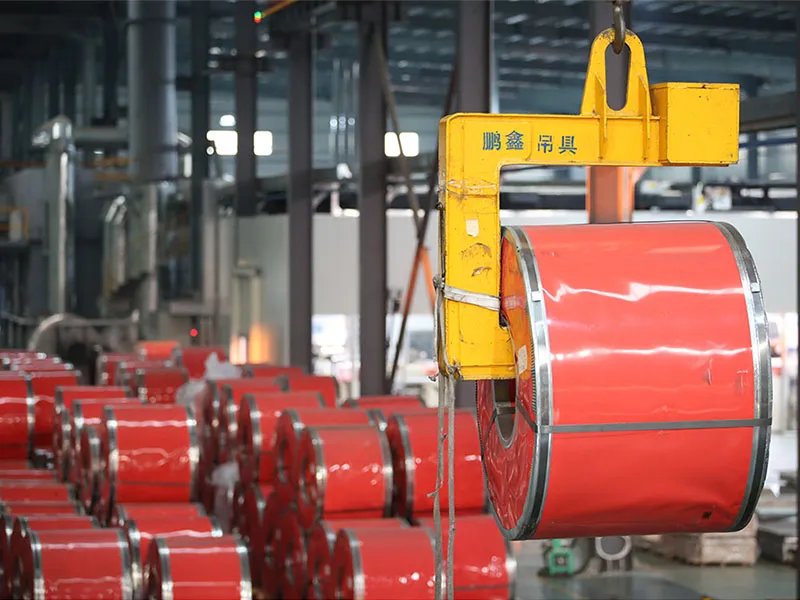Tinplate aerosol cans are widely used in daily life and industry as containers for spray products. They are small and portable, and are often used for spray paint, cleaners, lubricants, sunscreen sprays, insecticides, and more.
However, tinplate aerosol cans are strictly prohibited on air travel, and they can pose a serious safety risk, whether carried on board or in checked baggage.
Understanding why tinplate aerosol cans are prohibited on airplanes is crucial for passenger safety and air transport order.

Tinplate Aerosol Cans: Potential Dangers
Tinplate aerosol cans, also known as metal spray cans, are primarily made of tinplate and filled with compressed gas and liquid aerosol. Their characteristics include:
• High-pressure sealing: The internal pressure of a tinplate aerosol can typically ranges from 2 to 10 bar. Even a small can contains a large amount of compressed gas.
• Flammability and Chemical Resistance: Many aerosol products contain flammable or chemically active ingredients, such as butane, propane, alcohol, or volatile organic solvents.
• Corrosion Resistance: Tinplate is rust- and corrosion-resistant, but it can still break under high temperatures or intense friction.
These properties make tinplate aerosol cans safe and reliable in normal use, but they pose potential hazards in aviation environments.
1. High-Pressure Risk
Aircraft cabins and cargo holds typically maintain an air pressure equivalent to an altitude of approximately 2,000 to 2,500 meters during flight, meaning the air pressure is lower than on the ground. Carrying tinplate aerosol cans on board increases the pressure difference between the internal and external pressures, potentially causing them to expand or even explode. Even high-quality cans cannot fully protect against the risks posed by high-altitude, low-pressure environments.
2. Flammability and Explosion Risk
Many tinplate aerosol cans are filled with flammable gases and volatile liquids. If the can ruptures or the nozzle is accidentally activated, contact with a fire source or static sparks could cause a fire or explosion. The confined space, high passenger density, and onboard electrical equipment in an aircraft environment exacerbate the consequences of fires and explosions, posing a significant risk to the safety of the entire aircraft.
3. Chemical Contamination Risk
Some tinplate aerosol cans contain pesticides, cleaning agents, or solvents. Leakage of these chemicals can produce irritating odors or toxic gases. Leakage within the confined space of an aircraft can easily cause passenger discomfort, respiratory irritation, or even poisoning, seriously impacting aviation safety and passenger health.

Strict Restrictions on Tinplate Aerosol Cans in Air Transport
According to the International Civil Aviation Organization (ICAO) and the International Air Transport Association (IATA) Dangerous Goods Regulations, tinplate aerosol cans are classified as dangerous goods for the following reasons:
• Compressed Gas: Class 2 Dangerous Goods (Gases) poses a risk of explosion and combustion.
• Flammable Liquid: If the liquid in the can is a flammable solvent, it is classified as Class 3 Dangerous Goods.
• Characteristics of Spray-Type Products: Pressure and chemical composition together determine their hazard level, and most airlines prohibit them from being carried in or checked baggage.
Therefore, passengers are not allowed to bring tinplate aerosol cans into the aircraft cabin without special handling, whether on domestic or international flights.
1. Carry-on Baggage Restrictions
During security checks, tinplate aerosol cans are classified as flammable and dangerous goods and are prohibited in carry-on baggage. Airline security personnel often stop passengers carrying tinplate aerosol cans and ask them to return or discard them. The main reasons for this are:
• The cabin is enclosed, making it difficult to quickly evacuate the gas if a can ruptures or sprays;
• The varying quantities carried by passengers may pose a local safety hazard;
• Temperature and pressure fluctuations at high altitudes increase the risk of can rupture.
2. Checked Baggage Restrictions
Although the cargo hold is relatively spacious, checking tinplate aerosol cans still poses significant risks. The temperature and pressure in the aircraft cargo hold, collisions, and the pressure of stacked luggage can cause the cans to rupture or leak. Even products labeled "safety aerosol cans" must adhere to strict dangerous goods transport requirements, including:
• Quantity and total weight restrictions;
• Special packaging and isolation measures;
• Dangerous goods labeling and transport documents;
• Special approval for transport by the airline.
Most ordinary passengers cannot meet these requirements, so tinplate aerosol cans are generally prohibited from being carried in checked baggage.

Tinplate Aerosol Cans: The Difference Between Empty and Unused Cans
Some passengers believe that "empty" cans, since they contain no contents, pose little risk. In reality, even empty tinplate aerosol cans still pose the following safety risks:
• Residual pressure: There may be no liquid on the surface of an empty can, but a small amount of compressed gas may remain inside.
• Flammable residual liquid: There may be flammable liquid or volatile chemicals remaining at the bottom of the can or within the nozzle.
• High-temperature expansion: Temperature fluctuations in the aircraft cargo hold can cause the can to expand, leading to rupture or spraying.
Therefore, whether empty or unused, airline regulations prohibit the carriage or checked baggage of cans to ensure flight safety.
Tinplate Aerosol Cans: Potential Risks of Aviation Safety Accidents
Carrying tinplate aerosol cans on board aircraft can lead to several types of safety accidents:
• Can Explosion: Pressure differences, elevated temperatures, or friction and impact can cause explosions, directly damaging the cabin structure and onboard equipment;
• Fire Spread: Leaking flammable liquids or gases can ignite when exposed to a fire source, rapidly spreading fire in the confined cabin;
• Chemical Leak: A tinplate aerosol can containing toxic chemicals can rupture, releasing irritating or harmful gases, potentially causing respiratory irritation, vomiting, or coma in passengers;
• Psychological Panic and Difficulty Evacuating: Accidental rupture of a can produces noise or odor, potentially causing panic in passengers and affecting the crew's ability to handle emergencies.
Therefore, from a risk assessment perspective, tinplate aerosol cans are unacceptable hazardous materials on aircraft.

Safety Measures by Airlines and Regulators
To prevent accidents caused by tinplate aerosol cans, airlines and civil aviation regulators have implemented a number of measures:
• Strict baggage inspections and security checks: X-ray machines, liquid detectors, and manual inspections are used to intercept prohibited items;
• Dangerous Goods Education: Passengers are clearly informed before ticket purchase, check-in, and boarding that tinplate aerosol cans are prohibited;
• Dangerous Goods Approval System for Checked Baggage: Only tinplate aerosol cans that meet IATA dangerous goods transport requirements are approved for transport by airlines;
• Flight Safety Training: Crew members receive training in dangerous goods identification and emergency response to ensure they can promptly handle any dangerous goods discovered.
These measures have effectively reduced the potential risks of tinplate aerosol cans in air transportation.
Tinplate Aerosol Cans: Precautions for Home and Industrial Users
For home and industrial users, avoid carrying tinplate aerosol cans on air travel by taking the following measures:
1. Home Users
• Check cosmetics, cleaning sprays, insect repellents, and other items before traveling;
• If you find a tinplate aerosol can, discard it or send it by courier;
• Do not attempt to disassemble or ignite empty cans to reduce the risk, as airline security requirements are strict.
2. Industrial Users
• Factories and businesses traveling or transporting goods should apply for a dangerous goods transport permit through an air cargo company in advance;
• Professionally package, label, and isolate tinplate aerosol cans for transportation;
• Comply with dangerous goods transportation regulations and avoid unauthorized check-in on regular flights.
Why shouldn't you carry tinplate aerosol cans on airplanes?
Due to their high pressure, flammability, and chemical reactivity, tinplate aerosol cans pose a significant safety risk of explosion, combustion, and leakage in the low-pressure environment of high altitudes. Air transportation has strict restrictions on the carry-on and checked baggage of tinplate aerosol cans to ensure flight safety, the safety of passengers' lives and property, and the cabin environment.
Empty and unused cans are not permitted in carry-on or checked baggage. Household users should dispose of them properly by recycling or mailing them, while industrial users must comply with hazardous materials transportation approval and packaging requirements. Understanding and complying with these regulations is every passenger's responsibility for safety and is an important measure for maintaining air transportation order.
Can Dekai support wholesale purchasing for international buyers?
Yes, Dekai is a wholesale factory supplier in China, exporting tinplate packaging to many countries. We welcome international clients to buy directly from our factory at low prices. Our wholesale sales model reduces costs while ensuring high quality and reliable supply.
With an annual production of over 300 million units, we can meet large purchasing demands without delay. Buyers can request quotes for customized tinplate cans, lids, or aerosol products and enjoy discount promotions for bulk purchases.

